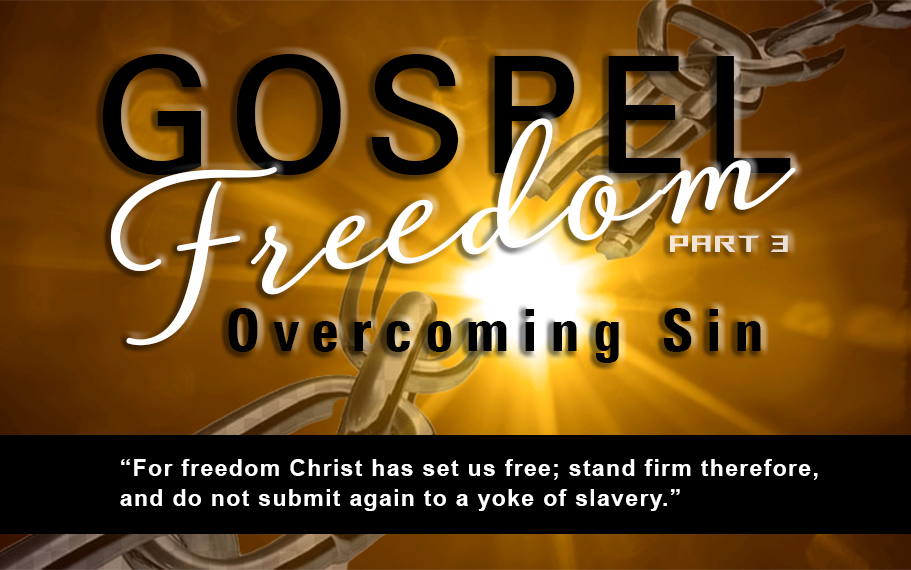Overcoming Sin
“For sin will have no dominion over you, since you are not
under law but under grace.”
Romans 6:14
In the previous blogs in this series, we have examined the various ways the Gospel sets us free. Today, we examine one of the most important ways the Gospel sets us free—by freeing us from our bondage to sin.
In the Scripture above, Paul teaches that since believers are not under the Law but under grace, sin no longer has dominion over them. What an incredible statement! There is no excuse therefore for letting patterns of sin control our lives.
But God doesn’t deliver us from sin all at once but progressively through the process known as sanctification. When we are regenerated, we are immediately delivered from the penalty of sin. And one day we will be delivered from the presence of sin, both in our own bodies, as well as in the entire universe. When God’s work in Christ is finished, and He (Christ) returns, sin and all of its effects shall be totally removed. But in the present, God is slowly delivering us from the power of sin. That means that every believer should find that sin’s grasp is progressively being weakened in their lives.
But how is sin’s power being progressively weakened in our lives? Paul doesn’t attribute it to human willpower (though certainly, we have to be willing to cooperate with the process) but to the fact that the believer is no longer under law but under grace. In other words, the only way for a person to be progressively delivered from the power of sin is by receiving and living by the grace of the Gospel.
I know this firsthand. Soon after I became a believer, I discovered that no amount of threats served to empower me to break with sin. I was regularly subjected to warnings about what would happen if I didn’t abandon my sin. I remember specifically being warned about what would happen if I was in a movie theater the moment that the rapture occurred. Our pastor unabashedly warned that I would definitely miss being ‘caught away’ if that was the case. I vividly remember, while watching a Christian movie, begging God not to let the Rapture happen until the movie was over and I had sufficient opportunity to repent and come back to God.
It was several years later that I discovered the fallacy of such an approach to dealing with sin. Such an approach is an attempt to be delivered from the power of sin by means of the law. When Paul uses the term law in the text above he is not limiting it to the Law of Moses but to the principle of law in general; the notion that, God’s blessings are predicated on having perfectly obeyed God. But those who seek to be righteous by the principle of law will only fall under condemnation as Paul points out in the letter he wrote to the Galatian church:
For all who rely on works of the law are under a curse; for it is written, “Cursed be
everyone who does not abide by all things written in the Book of the Law and do
them.” Now it is evident that no one is justified before God by the law, for “The
righteous shall live by faith.” But the law is not of faith; rather “The one who does
them shall live by them.” Galatians 3:10-12
What is the problem with seeking to be justified by the principle of law? It is not of faith but requires perfect obedience (“the one who does them shall live by them”). Many who live under law are persuaded that God judges on the curve—that is, that he looks at our attempts to obey and rewards our best effort. But Paul, in quoting from Leviticus 18, makes it clear that God requires nothing less than perfect obedience under the law. This is where Israel failed. She thought that just having the Law and hearing it read each week declared her righteous. But once again Paul makes it clear that it is only perfect obedience to the law that matters: “For it is not the hearers of the law who are righteous before God, but the doers of the law who will be justified” (Romans 2:13).
Faith, on the other hand, is based on an entirely different principle: that of trusting God to give us righteousness not our own. It is therefore by grace through faith that we are made righteous. And this is the only way we are empowered to break free from the power of sin that holds us in dominion. In Paul’s teaching, sin is exacerbated by means of law. But where there is no law, there is no sin. So the only way a believer can be free from the power of sin is by receiving what Jesus did on the cross of Calvary as a free gift that makes one righteous.



0 Comments